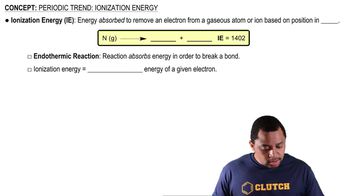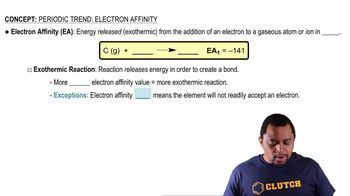Textbook Question
What is the relationship between the electron affinity of a singly charged cation such as Na+ and the ionization energy of the neutral atom?

 McMurry 8th Edition
McMurry 8th Edition Ch.6 - Ionic Compounds: Periodic Trends and Bonding Theory
Ch.6 - Ionic Compounds: Periodic Trends and Bonding Theory Problem 67
Problem 67 Verified step by step guidance
Verified step by step guidance

